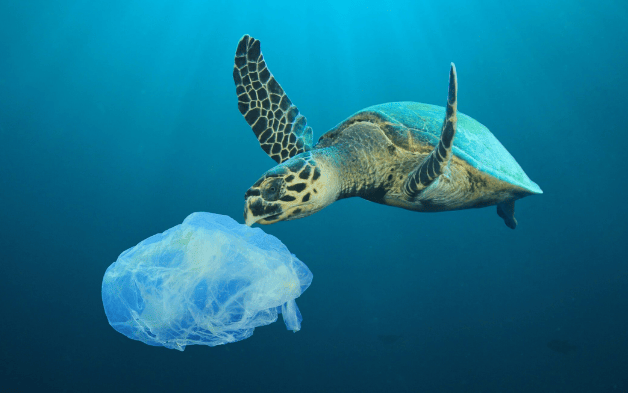Key Points
- July has been designated ‘Plastic Free July’ to turn the spotlight on the issue of plastic and packaging pollution.
- It is estimated that around 80% of all marine debris is made up of plastic waste.
- Some 32% of globally produced plastics escape collection, while only 14% of plastic packaging is recycled for future use.
- There is growing evidence that consumers are willing to pay a premium for bioplastics.
- Governments are increasingly implementing regulation to encourage more sustainable solutions for plastic production and disposal.
July has been designated ‘Plastic Free July’ by global not-for-profit group Plastic Free Foundation,[1] so it seems an appropriate time to examine the impact of plastics upon our world, and the steps that are being taken to combat this serious environmental problem.
Plastics and packaging have become a poster child for environmental pollution and neglect over the last few years which has led to a consumer backlash against plastic and packaging excess. This, in turn, has led to consumer goods companies redoubling their efforts to find ways to ensure that plastics can be recycled, reused, or composted.
In the UK alone, packaging accounts for around 30% of plastic demand, and plastic packaging makes up around 70% of all plastic waste. Plastic’s durable nature results in the production of microplastics, which often build up in waterways, and subsequently enter the food chain, harming local ecosystems and biodiversity. The stark scale of the problem is highlighted by the fact that an estimated 80% of all marine debris is made up of plastic waste.[2]
Growing Regulation
Other than the obvious damaging environmental consequences, companies that rely heavily on plastic remain exposed to reputational risk, reduced consumer engagement with their products, and the threat of regulatory fines.
In Europe, the European Union’s Circular Economy Plan has created specific proposals to tackle plastics and packaging, which focus on reducing waste, improving recyclability, and addressing the issue of microplastics. Moreover, regulation is increasingly coming into play, with extended producer responsibility laws being introduced, thus creating liability for producers over the use of plastic items and encouraging an increase in recycled content.
Changing habits are happening at the personal level too. Global consultancy Toluna conducted research on 5,900 European consumers last year, which revealed that 70% are actively taking steps to reduce their use of plastic packaging.
Bioplastic Resurgence
Moreover, there is growing evidence that consumers are willing to pay a premium for bioplastics, as biodegradability is seen as one important way to reduce plastic waste. Bioplastics can be broken down into two types: the first is produced from agricultural feedstock as opposed to oil, while the second type is designed to be biodegradable after use. The former, known as bio-based plastics, may help to reduce life-cycle carbon emissions, while the latter, biodegradable plastic, can address the ever-growing issue of plastic waste.
Investment Opportunities
There is no one solution to addressing the extent of plastic and packaging waste, nor to reaching net-zero carbon emissions. As such, we look at a range of potential solutions to reducing plastic and packaging waste for investment opportunities:
- Recycling: Some 32% of globally produced plastics escape collection, while only 14% of plastic packaging is recycled for future use. It is important to note that there is no ‘silver bullet’ here, as at least 38% of plastic must be made from new rather than recirculated feedstock.
- Paper: Paper is suitable for replacing plastic across several key items: film and wraps; rigid plastic packaging; sachets and multilayer film; pots, tubs, and trays; and disposable food containers.
- Bio-based Plastics: Around 6% of fossil-fuel demand is for plastic production, and on current estimates, that is set to grow to 20% by 2050. The growth of bioplastics offers a potential alternative and may also offer lower life-cycle carbon emissions over time.
- Biodegradable Plastics: These are a suitable solution for food packaging, so that leftovers and packaging can be composted together. In 2019, 59% of biodegradable plastic demand was for packaging.
Challenges to be Overcome
As investors, we are mindful that there are technical challenges associated with plastic recycling, and that there are limits to the amount of times that plastic can be recycled. Despite a multitude of commitments and pledges, relatively few companies have yet disclosed how much they will invest in packaging innovation and the shift from virgin to recycled plastic. Many biodegradable plastics also require industrial composting, which can create challenges around collection, but we are hopeful that the increased consumer focus on this area, combined with technological innovation and helpful regulation, will ultimately help to reduce the impact of plastic and packaging pollution on our planet.
Sources
Important information and disclosures
Any reference to a specific security, country or sector should not be construed as a recommendation to buy or sell this security, country or sector. Please note that strategy holdings and positioning are subject to change without notice.
Important Information
This is a financial promotion. Issued by Newton Investment Management Limited, The Bank of New York Mellon Centre, 160 Queen Victoria Street, London, EC4V 4LA. Newton Investment Management Limited is authorized and regulated by the Financial Conduct Authority, 12 Endeavour Square, London, E20 1JN and is a subsidiary of The Bank of New York Mellon Corporation. ‘Newton’ and/or ‘Newton Investment Management’ brand refers to Newton Investment Management Limited. Newton is registered in England No. 01371973. VAT registration number GB: 577 7181 95. Newton is registered with the SEC as an investment adviser under the Investment Advisers Act of 1940. Newton’s investment business is described in Form ADV, Part 1 and 2, which can be obtained from the SEC.gov website or obtained upon request. Material in this publication is for general information only. The opinions expressed in this document are those of Newton and should not be construed as investment advice or recommendations for any purchase or sale of any specific security or commodity. Certain information contained herein is based on outside sources believed to be reliable, but its accuracy is not guaranteed. You should consult your advisor to determine whether any particular investment strategy is appropriate. This material is for institutional investors only.
Personnel of certain of our BNY Mellon affiliates may act as: (i) registered representatives of BNY Mellon Securities Corporation (in its capacity as a registered broker-dealer) to offer securities, (ii) officers of the Bank of New York Mellon (a New York chartered bank) to offer bank-maintained collective investment funds, and (iii) Associated Persons of BNY Mellon Securities Corporation (in its capacity as a registered investment adviser) to offer separately managed accounts managed by BNY Mellon Investment Management firms, including Newton and (iv) representatives of Newton Americas, a Division of BNY Mellon Securities Corporation, U.S. Distributor of Newton Investment Management Limited.
Unless you are notified to the contrary, the products and services mentioned are not insured by the FDIC (or by any governmental entity) and are not guaranteed by or obligations of The Bank of New York or any of its affiliates. The Bank of New York assumes no responsibility for the accuracy or completeness of the above data and disclaims all expressed or implied warranties in connection therewith. © 2020 The Bank of New York Company, Inc. All rights reserved.
In Canada, Newton Investment Management Limited is availing itself of the International Adviser Exemption (IAE) in the following Provinces: Alberta, British Columbia, Ontario and Quebec and the foreign commodity trading advisor exemption in Ontario. The IAE is in compliance with National Instrument 31-103, Registration Requirements, Exemptions and Ongoing Registrant Obligations.




